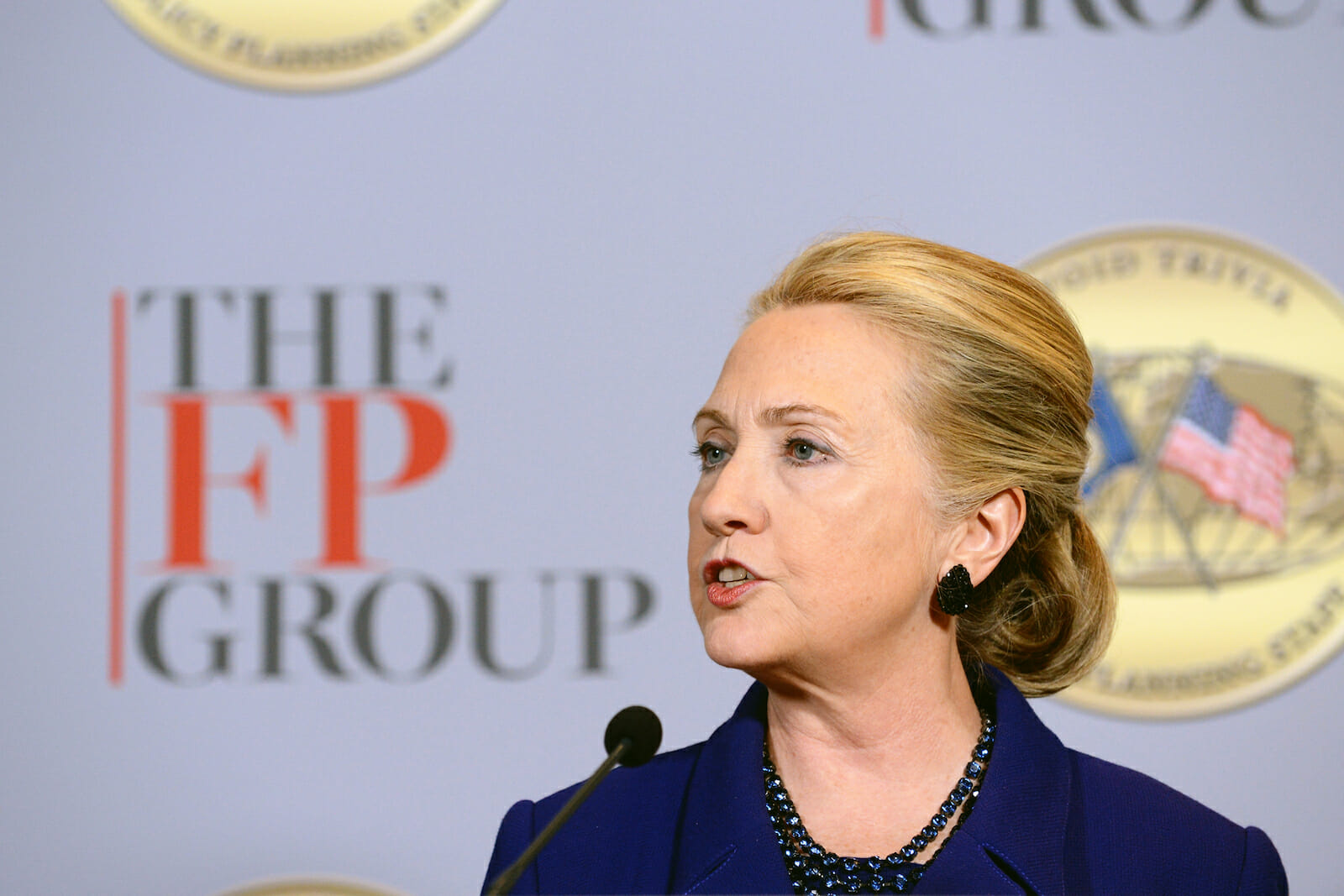
Mali: Not on Clinton’s Farewell Agenda
On August 10, 2012, Secretary Hillary Clinton ended her ten-day trip to nine sub-Saharan African countries: Senegal, Uganda, South Sudan, Kenya, Malawi, South Africa, Nigeria, Ghana, and Benin. The trip was publicized as her last to the continent, as Secretary of State in the Obama administration. The common thread throughout her structured remarks was on the building blocks for democratic institutions, good governance, rule of law, corruption, security, and trade.
In August 12, 2012, All Africa article, “Africa: Clinton Concludes African Trip,” Kimeng Hilton Ndukong noted that Mali’s security issues were briefly alluded to in several speeches, but no concrete solution to stabilize the country was offered. During Clinton’s visit, the crucial situation in northern Mali has only become worse, with over four hundred thousand Malians being displaced, escaping to refugee camps in Mauritania, Burkina Faso, and Niger.
Mali has limited interest to the United States and has not been on our radar screen since the March 22, 2012 coup d’etat which destabilized the country. The northern region, the size of France, is now under the control of radical Islamists. This democratic country of fifteen million people should have been the poster child for Clinton’s tailored remarks on building democratic institutions, good governance, and security concerns in sub-Saharan Africa.
A stop in Mali to meet with transitional government leaders, and offer meaningful support to underpin the democratic regime, would have given Malians hope for the future; with countless lives being saved along the way. It would have also sent a clear message to other sub-Saharan African countries that the U.S. will support democratic regimes in their fight against radical Islamists — to maintain their freedom.
On August 10, 2012, in the All Africa article “Nigeria: Clinton to Jonathan – How You Can Fight Terrorism,” Ben Agande and Uduma Kalu stated that the U.S. offered Nigeria help to fight the Islamic group Boko Haram. An official in Secretary Clinton’s entourage said Boko Haram posed a threat to the West African countries, having links to al-Qaeda insurgents in northern Mali. Since the March coup in Mali, Tuareg rebels and Ansar Dine Islamists have associated with Boko Haram from Nigeria, Al Shabaab from Somalia, Al-Qaeda in the Islamic Maghreb (AQIM) from Algeria; Taliban trained fighters from Afghanistan and Pakistan. These radical Islamic groups want to take control of the Sahel region and institute Sharia, the brutal Islamic law.
The United States has had over four months since the coup to press the United Nations Security Council (UNSC) to empower the Economic Community of West African States (ECOWAS), of which Mali is a member, to send troops into northern Mali to fight and expel the Islamic insurgents; which ECOWAS had offered to do on several occasions.
In my August 3, 2012, commentary “Obama’s Policy Directive on sub-Saharan Africa,” I noted that Mali was caught between the road to democracy, ruthless power seekers, and radical Islamists fighting for the same turf. The destabilization in Mali has opened the door to radical Islamist groups, who have taken control of a large region in northern Mali and beyond. Such instability across the Sahel can only benefit the jihadist movement that wants to take control of these African countries.
President Mahamadou Issoufou of Niger warned the world in the June 7, 2012, Reuters article “that Afghan and Pakistani jihadis were training recruits for Islamist groups in northern Mali, the latest sign it is slipping into terrorist hands.” He noted “the necessity for a UN Security Council resolution on the Mali situation to allow the use of force to restore the integrity of Mali’s territory.” Issoufou’s wake-up call to the United States and others so far has fallen on deaf ears. 
The ECOWAS community continues to offer military support to bring stability to the northern region of Mali. However the UNSC Resolution 2056 passed on July 5, 2012, did not approve immediate action to restore stability and civilian governance. The UNSC rhetoric only emboldened the Islamists to continue their atrocities against Malians and the destruction of irreplaceable shrines, which is a real tragedy. Timely action by the U.S. could have saved many lives and prevented the displacement of thousands of Malians from their homes.
According to a State Department Press Release on July 12, 2012, “President Obama authorized the use of up to $10 million from the Emergency Refugee and Migration Assistance Fund to respond to the unexpected and urgent refugee and migration needs resulting from the conflict in northern Mali” and “provide life-saving protection and assistance to those fleeing the conflict.” The press release further noted, “This gravely low level of support threatens essential life-saving operations, such as the provision of shelter, clean water, proper sanitation, and basic health services.”
With the bulging refugee population in these camps, the limited humanitarian aid can only feed these destitute transplants for thirty to sixty days. Malians however just want their freedom back, and get on with their livelihoods, even though more than half the population lives at the poverty level, on less than $1 a day. Allowing this humanitarian disaster to continue will be a blemish on our image, since the U.S. instigated the Arab Spring in Libya, the catalyst to destabilizing Mali. Secretary Clinton would have been well served to use her “finale” in Africa, to show strong support for taking out the brutal Islamists, and restore democracy in Mali.
Her words for immediate action would have been well received, and a great opportunity to rebuild friendships in sub-Saharan Africa, showing that we are not just “fair-weather friends.” Instead, the orchestrated audiences received lectures on our Western principles, and the new “Presidential Policy Directives (PPDs)” for sub-Saharan Africa: to strengthen democratic institutions; spur economic growth, trade, and investment; advance peace and security; and promote opportunity and development.
I have embraced sub-Saharan Africa since my first visit in 1970. I had the honor to serve as U.S. ambassador to three East African island nations from 2002 to 2005. I visited Mali several years earlier, and have since become acquainted with some of the country leaders. My commentaries on Mali’s plight have evolved into an invitation for a fact-finding visit. The invitation noted that the “trip to Mali will be beneficial to you and the people of Mali. Such a visit will give you more authority in your advocacy work in Africa. It will bring a lot of attention to Mali.”
I will travel to Mali in early September for a ten-day visit. Meetings have been set up with President Dioncounda Traore, Prime Minister Cheick Modibo Diarra, Minister of Foreign Affairs Tieman Coulibaly, and several other country leaders. I also plan to visit the refugee camps in Mauritania, Burkina Faso and Niger to see firsthand the plight of the Malian diaspora. And lastly, I will meet with educators at the Mali Rising Foundation village school program.
As the United Nations General Assembly gets underway on September 18, 2012, I hope the Obama administration instructs Susan Rice the U.S. ambassador to the United Nations, who serves on the UNSC, to finally take a more aggressive stance and press for military support in Mali. To underpin this fledgling democracy in its fight against the Islamists, who have taken control of over half the country, is paramount. Mali deserves our support if we are going to show the world that we champion democratic institutions.
The United States should not allow the UN to place too many conditions on Mali before help arrives, after years of turning a blind eye on corrupt and autocratically ruled countries in sub-Saharan Africa. To gain respect for our form of democracy–alien in this part of the world–the U.S. must make Mali our poster child for democracy. We need to show that we have a consistent policy towards sub-Saharan Africa. If we do, we will have a greater chance to leave a positive footprint and help guide these countries onto the path of freedom, and diminish the influence of the jihadist movement in their quest to create a Pan-African caliphate.
